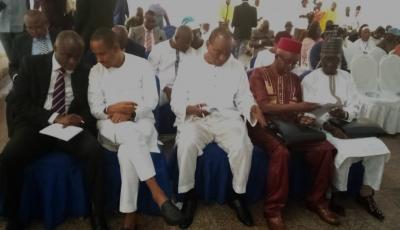
Highs and Lows in the Peace Dialogue Agreement Between APC Party and SLPP Regime
By a press release (25/10/2023)
The legal opinion seeks to examine the highs and lows of this collective bargaining agreement in a bid to give a contextual analysis of the peace talks.


Apparently, the peace negotiations and dialogue which lasted for 3 days, ended on the 18th of October 2023 with an agreement signed by the two main political parties and witnessed and endorsed by the international partners and the Independent Commission for Peace in Sierra Leone. At the release of the collective bargaining agreement however, many Sierra Leoneans including activists and political commentators have decried the agreement as one that sets a dangerous precedent and further undermines the rule of law, democracy and transparent elections in the country in the future. Some proponents have however expressed optimism about the agreement and applaud it for bringing back the main opposition APC party into governance. More details on this legal opinion thus – (Photo: During the hopeless Dialogue).
Justice | Law | Rights
LEGAL LINK
+23279167457 | +23288646294
89 Fort Street
Freetown | Sierra Leone
24th October 2023
ADVISORY OPINION
EXAMINING THE HIGHS AND LOWS IN THE PEACE DIALOGUE AND COLLECTIVE BARGAINING AGREEMENT BETWEEN THE APC PARTY AND THE SLPP GOVERNMENT FACILITATED BY INTERNATIONAL PARTNERS AND THE INDEPENDENT PEACE COMMISSION
Introduction
In an unprecedented move in the geopolitical history of Sierra Leone, the international partners, particularly the Commonwealth, the AU and ECOWAS have successfully brokered a peace dialogue between the main opposition APC party and the ruling SLPP government in a bid to ensure that peace, democracy and good governance are not undermined in the country. It could be recalled that after the pronouncement of the election results by ECSL in June 2023, the main opposition APC party decided to boycott governance due to the incessant refusal of ECSL to conduct transparent elections and publish disaggregated data by polling stations to ascertain the veracity of the results pronounced among other things. Apparently, the peace negotiations and dialogue which lasted for 3 days, ended on the 18th of October 2023 with an agreement signed by the two main political parties and witnessed and endorsed by the international partners and the Independent Commission for Peace in Sierra Leone.
At the release of the collective bargaining agreement however, many Sierra Leoneans including activists and political commentators have decried the agreement as one that sets a dangerous precedent and further undermines the rule of law, democracy and transparent elections in the country in the future. Some proponents have however expressed optimism about the agreement and applaud it for bringing back the main opposition APC party into governance. But whatever the arguments might be, this legal opinion piece seeks to examine the highs and lows of this collective bargaining agreement in a bid to give a contextual analysis to the issues and the content and terms enshrined within the agreement.
THE HIGHS IN THE COLLECTIVE BARGAINING AGREEMENT
1) The issues agreed at the peace dialogue were reduced into an agreement in writing and signed by the parties. This formula is quite commendable indeed. It is always important that parties to a dialogue endeavour at the end to reduce all that has been agreed by the parties into a concrete agreement framework, put in writing and signed up by all participating parties. Such an agreement framework will impute an intention to create legal relations by the parties and therefore make the terms within the agreement binding and enforceable.
2) The main opposition APC Party is returning to governance – This is perhaps the most outstanding achievement of the peace dialogue as the main opposition APC party has agreed to return to governance. For almost four months now, the APC party refused to participate in governance due to the refusal of ECSL to publish disaggregated data by polling stations in the just concluded 2023 elections in Sierra Leone. To have them agree to return to governance was indeed a big win for governance and democratic continuity.
3) A Tripartite Committee involving the International Community will be formed to look into the 2023 elections and profer recommendations. This is also a plausible outcome in the agreement as many Sierra Leoneans would like to know what actually transpired in the 2023 elections and to also have an audit on ECSL regarding their handling of the 2023 elections. In the agreement, it was also stated that the Tripartite Committee should do this election review within six months and proffer recommendations that will be actionable and implemented by the state. This is certainly a plausible step and one that many Sierra Leoneans would like to see happen in the country since the government have been openly indicted of not doing much to ensure an independent elections review of the 2023 multi-tier elections
4) A Committee to be established to monitor the implementation of the agreement – This is also a plausible outcome of the agreement as such a Committee which will comprise moral guarantors and CSO representatives will help monitor and ensure accountability and compliance from all parties to the agreement. (Photos: APC and SLPP officials, right).


THE LOWS IN THE COLLECTIVE BARGAINING AGREEMENT
1) The agreement was largely driven and motivated by politics and selfish aspirations – It is clear that the two parties to the agreement were solely focused on protecting and promoting their personal and political interests as against the national interest of ordinary citizens in the state. For eg, the SLPP government seemed to be more focused on bargaining to continue in power and care less about ECSL’s abrogation of the rule of law and the conduct of transparent elections. The APC party on the other hand was largely focused on getting its political cases in court dropped, political prisoners freed and getting backlog salaries and benefits to councillors and Parliamentarians as they return to work and governance. Not much could be seen in the agreement in relation to holding ECSL accountable over its incessant refusal to publish disaggregated data by polling stations or demanding accountability and/or reparations for the hundreds of lives lost and the collateral damage occasioned to political party structures and personal properties of supporters before, during and after the elections. This wilful omission to address national concerns is believed by many Sierra Leoneans to be the biggest downside of the collective bargaining agreement.
2) The agreement was Badly drafted with so many ambiguities and loopholes to be exploited – A cursory look at the agreement signed by the parties reveals so many ambiguities and loopholes. For example, the agreement requires the APC party to come up with a list of political cases and prisoners. However, the agreement did not define political cases or prisoners. Hence, any case or prisoner can be listed by the APC party as qualified for pardon or amnesty. Also, the agreement did not talk about any limits in terms of a number of cases or prisoners. Hence, the list can be as long as APC may choose or decide. Furthermore, upon submission of the list, the SLPP-led government is not bound to act on it but may rather consider to act or not act. The words used in the agreement are that the list would be submitted for “government’s consideration”. Certainly, this bad drafting and wrong choice of diction in the agreement creates room for ambiguities and loopholes which might be negatively exploited by the parties. It is vital for words in an agreement to always be made unambiguous and watertight in order to prevent wrong interpretations between and amongst the parties.
3) Not involving ECSL as a party was a grave mistake
Without any doubt, it is clear as crystal that the case by the main opposition APC party was largely against ECSL for their refusal to publish disaggregated data by polling stations. Surprisingly, however, in the dialogue that ensued, it was the ruling SLPP government that was the other party and not ECSL. We note that ECSL was never made a core party under the agreement. Hence, not much was secured under the agreement regarding the conduct of transparent elections by ECSL. Perhaps, it would have made a lot of difference had ECSL been included as a core party to the agreement. This missed opportunity has left the ECSL today with no consequences for their refusal to publish disaggregated data by polling stations as required by international law and best practices.
4) No CSO or other political parties or moral guarantors were made parties to the agreement
Aside from the two main political parties in the country (SLPP and APC), no other political party was involved in the collective bargaining agreement. This gives a wrong impression as though the other political parties are comfortable with the status quo. Furthermore, many key CSOs and moral guarantors were also marginalized from the dialogue process and no CSO or moral guarantor was made a party under the agreement either. This deprivation of the voices of conscience and watchdogs of the people makes the agreement mere political rhetoric rather than an agreement with a national focus.
5) The agreement did not address the Core complaint of APC in concrete terms
It is important to emphasize that the main reason for the governance boycott by the main opposition APC party was ECSL’s refusal to conduct transparent elections and publish disaggregated data by polling stations. Unfortunately, the agreement did not in any way put pressure on ECSL to publish disaggregated data nor hold them to account for such abrogation of international law and best practices. This is perhaps the worst outcome of the dialogue process. In fact, many critics are of the view that ECSL has been emboldened by this outcome to continue with its non-transparent approach to the conduct of public elections in the future.
6) No mention of accountability and/or compensation for human lives lost before, during and after the elections. It is disheartening to note that the agreement did not mention anything about accountability and or compensation for the hundreds of extrajudicial killings that occurred before, during and after the elections. Even the APC party could not make a case for accountability or compensation for the extrajudicial killings that took place in their party offices or the killing of their political activist, Evangelist Samson in cold blood. Many Sierra Leoneans believed that the avoidance of this crucial matter was a missed opportunity to hold the government to account for the extrajudicial killings that occurred before, during and after the 2023 elections.
7) The tripartite Committee that was established under the agreement conflicts with the earlier elections review committee established by the President. Apart from the tripartite Committee to be established under the agreement to look into the 2023 elections and make recommendations, it is vital.to pinpoint that the President had earlier established a similar Committee headed by the Vice President to look into the 2023 elections and proffer recommendations for reforms. This duplication of frameworks, it, therefore, leaves everyone in doubt as to which of the two frameworks will reign supreme regarding the election review process. Is it the one established by the president or the one agreed to under the agreement? This is anyone’s guess to make.
8) No demand for accountability and or compensation for physical abuses or collateral damage that happened to political party supporters or their political party offices and personal houses/properties. It is clear as crystal that the agreement did not also touch on accountability and or payment of compensations to political parties, supporters, victims and their families who suffered collateral damage, and physical and emotional abuse during and after the 2023 elections. This is another missed opportunity to heal the wounds of many traumatized families in the nation. (Photo: Legal Link boss Lawyer Rashid Dumbuya).

9) The agreement is not time-bound.
It is worth noting that the collective bargaining agreement is not subject to an expiry date. It may therefore exist in perpetuity and implementation of terms can be delayed as long as possible.
10) No sanctions exist for failure to implement key terms under the agreement
There’s an acute absence of sanctions for non-compliance under the agreement by the parties. The absence of the threat of sanctions for non-compliance may incentivize parties to not fully comply with the terms of the agreement going forward.
11) No independent Witness to sign the agreement
It is also noted in the agreement that no independent Witness such as CSOs and or moral guarantors were given an opportunity to serve as witnesses to the agreement. This is a testament that CSOs and moral guarantors of the peace were marginalized in the entire dialogue process by the facilitators. The only witnesses are the international partners and the Independent Commission for Peace. It is vital to note however that these actors would have to leave the jurisdiction and may not always have the time to follow up on compliance by the parties to the agreement. On the contrary, CSOs and moral guarantors do have the time and are always within the jurisdiction. It would have been prudent therefore to have included them in the agreement as witnesses at the very least.
12) No mention of the case filed at the Supreme Court by Augustine Marrah against ECSL concerning the release of disaggregated data by polling stations. Having missed the opportunity to address this matter through court action, one would have expected the APC party, in particular, to have insisted on a clause in the agreement that speaks about the current election case before the Supreme Court filed by Augustine Marrah Esq, demanding that it be expeditiously dealt with on the merit to ascertain whether it is fair, just and proper for ECSL to refuse giving out disaggregated data by polling stations as demanded by political parties and /or electorates after the announcement of the results. This omission was certainly a missed opportunity indeed.
13) No pathways created for redress in the courts should a party renege under the agreement.
A closer view of the agreement will reveal that there is a shortage of clauses that open room for court action should there be any infraction from either of the parties. A good agreement always has words inserted that leave room for recourse to the courts should there be an abrogation of the agreement by any of the parties.
14) The agreement indicts the judiciary to have handled court cases in a political way.
The use of words like “politically motivated court cases” in the agreement seems to suggest that the Courts were never independent or impartial in their handling of these cases. These admissions erode confidence in the judiciary and further widen public distrust for our justice system.
15) The agreement is Unconscionable, legally incomprehensible and defeats the rule of law, Democratic accountability and the conduct of transparent elections by ECSL in the future. Without a doubt, this agreement will certainly pose a serious problem for democratic accountability and transparent elections in Sierra Leone in the future. Not only has ECSL been emboldened but the failure to reach a consensus for the production of disaggregated data by polling stations undermines public trust and confidence in the body politics of the country going forward.
Conclusion
While opinions may vary as to the merits and demerits of the collective bargaining agreement signed on 18th October 2023, one thing to be applauded however, is the fact that this agreement has opened up an opportunity for a fresh stimulus and sigh of relief in our governance system and architecture after almost 4 months of suffocation and deadlock. But will the parties be able to display sincerity, commitment and good faith and further transform this seemingly disappointing agreement into real outcomes that will benefit the Sierra Leonean people and ensure transparent elections in the future? Only history will tell.
FAITHFULLY SUBMITTED
RASHID DUMBUYA Esq
Executive Director of LEGAL LINK and Former Commissioner for Human Rights in Sierra Leone
For and on behalf of the LEGAL LINK TEAM
For more information about LEGAL LINK, contact us at:
No 89 Fort Street, Off Circular Road, Freetown, Sierra Leone, West Africa
Email: rashiddum@yahoo.co.uk



